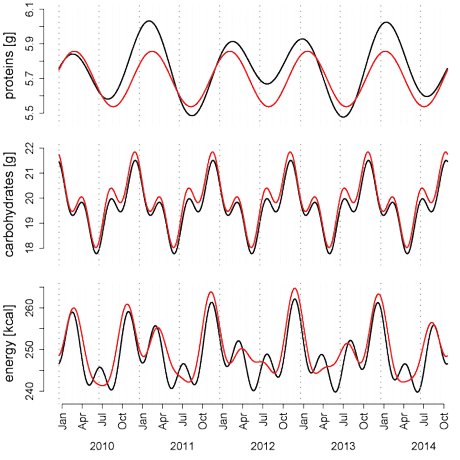by Christoph Trattner, Tomasz Kuśmierczyk and Kjetil Nørvåg
Food is a central part of our daily lives and is one of the most important factors that shape our health and well-being. Although research on individual food preferences has existed as a well-established field of study for several decades, there has been very little attention devoted to understanding recipe consumption and production patterns on the World Wide Web. To contribute to knowledge in this area, we recently initiated “FOODWEB”, a research project that studies traces of users online with the goal of better understanding how we consume and produce food.
Contrary to classic nutrition research, our methodology in the FOODWEB project is rather pragmatic. Rather than relying on time consuming and expensive user surveys, which are commonly used in nutrition research, we intend to mine traces of users online (e.g. from online food forums). We then analyze this data to draw conclusions about a population of users (e.g. in a country or a region) or at the individual level. The project started in October 2014 with support from ERCIM (in the form of an Alain Bensoussan Fellowship to the first author of this article, who was hosted by NTNU, Norway).
In order to conduct our research, we created a dataset by mining kochbar.de, one of the largest online food communities. Like other related websites, people can upload recipes, rate and comment on recipes, join or create groups to share cooking experiences or create social links to follow each other. What makes kochbar.de interesting as a test bed is not only their huge user base (and therefore the coverage of a huge population), but also the rich amount of metadata – which is usually not the case when conducting survey-based research. Interesting information available includes detailed descriptions of the ingredients used and the preparation steps needed to cook a meal, detailed nutrition facts per serving, and detailed user information, such as the user’s gender and region. This dataset encompasses more than 400,000 recipes published between 2010 and 2014, and over 200,000 users.
Our project started with an exploratory analysis of the dataset and several research questions. Two initial papers were published at WWW’2015 [1] and TempWeb’2015 [2], with interesting findings on temporal effects in how we consume and produce food online. Interesting findings included temporal effects in terms of production and consumption over the course of a year (see Figure 1) and over a week. As a proxy for consumption we used ratings provided by the users to a given recipe, and “recipe uploads” were used a proxy for production. Another interesting finding was that some food categories are remaining significantly more interesting to the users over time than others – e.g. vegetarian recipes have a very short life time, while spring food stays interesting to people over a longer period. This finding is important since it suggests that temporal effects significantly influence food preferences, and researchers or engineers who are developing recommendation services in such platforms could, for example, take this into account.

Figure 1: Seasonal trends in online recipe production (red plot) and consumption (black plot) for proteins, carbohydrates and calories per 100g.
Currently, we are in the process of obtaining data from other online community platforms. We are using this to investigate several interesting variables, including cultural differences, user characteristics – such as age and gender – and many more. The project is continuing to grow and current contributors include researchers from the Know-Center (Austria), NTNU (Norway), L3S (Germany), Freie University of Bolzano (Italy), and TU-München (Germany).
References:
[1] T. Kuśmierczyk, C. Trattner, K. Nørvåg: “Temporality in Online Food Recipe Consumption and Production”, In Proc. of WWW’15, 2015.
[2] T. Kuśmierczyk, C. Trattner, K. Nørvåg: “Temporal Patterns in Online Food Innovation”, in Proc. of TempWeb'201, 2015.
Please contact:
Christoph Trattner
Know-Center, Graz, Austria
E-mail:
Christoph Trattner was an ERCIM Fellow hosted by NTNU











